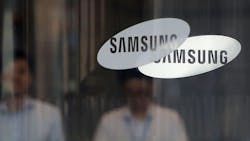Samsung Revamps Leadership as Earnings Fuel Investor Payouts
Samsung Electronics Co. has cleaned out its most senior executives just hours after posting record profit and doubling investor payouts.
Lee Sang-hoon has been nominated as the next board chairman while all three co-CEOs were replaced in a massive shakeup of the top ranks. The announcement came hours after Samsung topped profit estimates and said it would boost dividends to 9.6 trillion won ($8.59 billion) in each of the next three years.
While Samsung has long used a sense of crisis to drive performance, the past year has been testing by any measure. Heir apparent Jay Y. Lee is in jail for corruption, its Note 7 smartphones had a tendency to explode and its most senior executive announced his departure this month. While the company’s chip and display units have led to record earnings, there have been public calls for reform and it’s now separating the chairman and CEO roles for the first time.
“Samsung’s ensuring there’s checks and balances between a business CEO calling the shots and a board chairman overseeing financial decisions,” said Sung Tae-yoon, an economics professor at Seoul’s Yonsei University. “By separating the board chairman and CEOs, Samsung’s trying to improve the transparency of its corporate governance.”
South Korean President Moon Jae-in, who came to power in May, has raised the pressure on Samsung and other chaebol, the conglomerates that dominate the nation’s economy. His appointments have included a prominent critic of Samsung.
Along with the new chairman, Samsung will retain its three co-CEO structure for the business units. Kim Ki-nam will succeed Kwon Oh-Hyun as head of the display and semiconductor division, Kim Hyun-suk will replace Yoon Boo-Keun at consumer electronics and DJ Koh will take JK Shin’s place at the helm of mobile phones. Shin and Yoon offered to resign while Kwon earlier this month announced his retirement.
Jay Y. Lee is appealing his five-year sentence and has consistently denied the charges. It’s not clear how he would fit into the new leadership structure.
Samsung shares closed at a record in Seoul, rising 1.9% to 2,754,000 won ($2,465.38). Earlier buybacks and growth in semiconductor and display earnings have helped Samsung stock outperform Apple in the past two years.
Kwon, who is the most senior executive at Samsung Electronics, talked about the need for renewal when he announced his resignation earlier this month.
“As we are confronted with unprecedented crisis inside out, I believe that time has now come for the company to start anew, with a new spirit and young leadership,” he said in the Oct. 13 statement.
In addition to the increased dividends, capital spending will reach 46 trillion won ($41.18 billion) this year as it focuses on production of chips and displays. Samsung is setting aside half its free cash flow for shareholder returns. After the dividends, the company may use any remaining portion of that money for share buybacks “as deemed appropriate.”
“Samsung’s plan is in line with the expectations of foreign investors who have eagerly sought better dividends,” said Claire Kim, an analyst at Daishin Securities Co. “The overall return to shareholders will remain the same.”
Net income rose to 11.04 trillion ($9.88 billion) won in the three months ended September, the company said Tuesday in a filing. That compares with the 10.8 trillion won ($9.67 billion) average of estimates compiled by Bloomberg. Operating profit was 14.5 trillion won ($12.98 billion) on sales of 62 trillion won ($55.50 billion).
Investments in chips and displays has helped Samsung capitalize on the rally in semiconductor prices and demand from rivals for smartphones using organic light-emitting diodes. That helped the business post operating income of 9.96 trillion won ($8.92 billion).
Operating profit from the phone business was 3.29 trillion won ($2.95 billion) as the Galaxy S8 and Note 8 smartphones helped restore consumer confidence after last year’s Note 7 showed a tendency to explode.
Consumer electronics, which includes TVs and appliances, had profit of 440 billion won ($393.89 million), the company said.
By Sam Kim
About the Author
Bloomberg
Licensed content from Bloomberg, copyright 2016.
